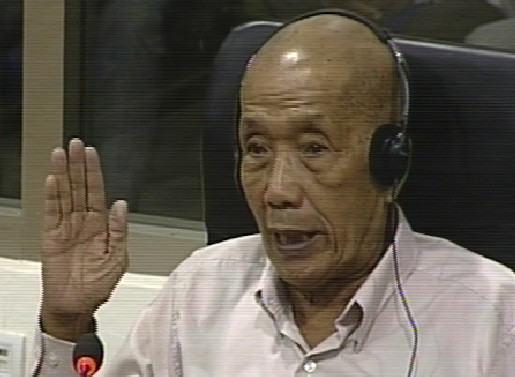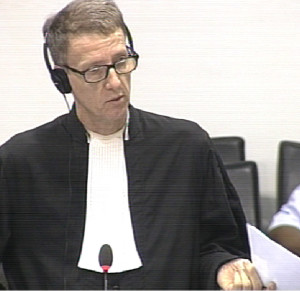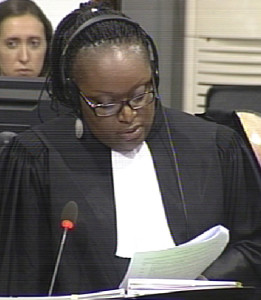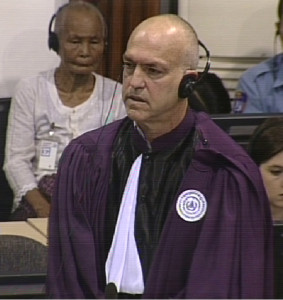Testimony of Former S-21 Chairman Kaing Guek Eav alias Duch Comes to End
Kaing Guek Eav, alias Duch, ended his testimony in the case against Nuon Chea and Khieu Samphan. Duch was sentenced to life imprisonment in 2012 for crimes against humanity and grave breaches of the Geneva Conventions of 1949, which establish the international rules for humanitarian treatment in war. He had testified only for a few more days in 2012 in Case 002 and had not appeared in Court since. This time, he was present and testified for 12 days in the second phase of Case 002. During his examination by the Prosecution, Civil Parties, the Chamber and the Defense, Duch described his involvement and revealed the extent of his knowledge on a multitude of issues.
Prosecution (June 7, 2016 to June 9, 2016 and June 13, 2016 to June 14, 2016)
- Responsibility and role of Nuon Chea, second-in-command under Pol Pot, at S-21 and his relation with Duch
- Structure and chain of command of the Communist Party of Kampuchea (CPK)
- Treatment of former Lon Nol officials and soldiers
- Links between S-21 and different security centers, including Ta Khmao
- Medical experiments and live surgery on S-21 prisoners
- The fate of women and children brought to S-21
- Interrogation methods and torture at S-21
- Incrimination of prisoners through other confessions
- Vietnamese nationals at S-21
- Responsibility and role of Khieu Samphan in the Communist Party of Kampuchea (CPK)
- “Internal purges” of Party leaders: their arrest, imprisonment and interrogation
Civil Parties (June 9, 2016 to June 10, 2016 and June 16, 2016)
- Westerners imprisoned and interrogated at S-21
- Sexual assault and rape at S-21
- Links between S-21 and different security centers, including Ta Boeung Trabey (also transcribed as Ta Boeung Trabek)
- Revolutionary Moral Precepts
- Interrogation methods and torture at S-21
- The fate of women and children brought to S-21
- Structure and chain of command of the Communist Party of Kampuchea (CPK)
- Reparation projects of Case 002
The Chamber (June 14, 2016 to June 16, 2016)
- Additional interrogation techniques of cadres: threats and intimidation
- Torture at S-21
- Structure and chain of command of the Communist Party of Kampuchea (CPK)
- Responsibilities of Duch and organization at S-21
- Last days at S-21
- Medical experiments and live surgery on S-21 prisoners
- Vietnamese nationals at S-21 used as political and propaganda tools
Defense of Nuon Chea (June 16, 2016; June 20, 2016 to June 21, 2016; June 23, 2016 and June 27, 2016)
- Methods of torture at S-21: learning from the French colonists and the Lon Nol regime?
- Chain of command at S-21: reporting to Son Sen and Nuon Chea
- Extent of the witness’ knowledge of Party affairs
- Last days at S-21
- Surveillance and incrimination of Party cadres (“internal purges”)
- “Internal purges” of Party leaders: their arrest, imprisonment and interrogation
- Links between S-21 and different security centers, including Prey Sar (S-24) and Kampong Chhnang Airfield
- S-21 numbers
- The role of Vietnam in the politics of Democratic Kampuchea and contemplated coup d’état against Pol Pot
- Principle of secrecy under the Regime
Defense of Khieu Samphan (June 22, 2016 and June 23, 2016)
- S-21 and principle of secrecy under the Regime
- Pressure and interrogation methods at S-21
- Links between S-21 and different security centers
- Incrimination of Party cadres (“internal purges”)
- Last days at S-21
Children under the Khmer Rouge
Co-Counsel for the Defense of Nuon Chea Victor Koppe had 45 minutes to conclude his interrogation of Duch today, but it took him about an hour to cover all the topics he wanted. To start, Mr. Koppe returned to a document he mentioned last Thursday about prisoners, including 160 children being transferred from Prey Sar, the rice fields (S-24) to Choeung Ek, one of the killing fields.[1]
Duch had said he was not aware of the circumstances of the transfer, so Mr. Koppe then proceeded to ask the witness about what happened to children of prisoners when they were arrested. Throughout his testimony these past weeks, the witness had stated several times that the policy was to “smash” children when their parents were arrested, according to the Party line: “When digging grass, the roots need to be taken out”. In the interview cited by the Co-Defense Counsel, a woman reported that near the village of Stoeng Baku, a labor camp, the daily work was to transplant rice seedlings, as well as looking over 70 or 80 children who worked in the field and had been taken from their parents who were accused of having “political tendencies” in Phnom Penh[2]. However, the witness did not know about taking care of children.
Blood draws at S-21
Responding to Mr. Koppe, Duch confirmed a previous statement he had made about blood draws, asserting he himself never authorized or see blood draws being performed, but that it was Son Sen, Minister of National Defense under the Khmer Rouge regime, who gave instructions that he relayed to S-21 staff at the time[3]. Confronted to minutes of a 1976 CPK Standing Committee meeting with the Ministry of Health and the Ministry of Social Affairs on the practice of drawing blood to “save the lives of our fighters at the border” [4], witness Duch said he was not aware of such a policy and could only recall that:
“The instruction from 870 [the Central Committee] was to draw blood from prisoners who were in good health, and not from the ones with STDs.”[5]
“The head of S-21 did not kill prisoners with his own hand.”
Duch recalled an event during which Nuon Chea had given him presumably lethal capsules that he was to test on prisoners in secret. However, since he did not “kill prisoners with his own hand”, he recalled he had replaced the content of the capsules with paracetamol.[6] Counsel Koppe seemed skeptical as to the witness’ answer, but Duch did not budge when confronted with an additional quote from a Party official, who had said he was a “contemptible killer”.
When questioned about interrogation methods at S-21, Duch had affirmed that there was no “immersion basin” to torture prisoners. He stood by this, and also confirmed what he had said before about blackboard in interrogation rooms: “I never saw blackboards with instructions. In my opinion, they were added by the Vietnamese soldiers after January 7, 1979 [the fall of the Khmer Rouge regime].” [7]
Mr. Koppe, as he did earlier in his examination, pointed out inconsistencies in Duch’s statements. In relation to the blackboards, that he had previously said: “I never entered an interrogation room” and that he was not aware of other practices heard in other testimonies, such as medical experiments. Weighing his words, Mr. Koppe asked:
Mr. Witness, is there anything else you consider a “fabrication”?
Duch was not able to provide a clear answer, and the Co-Defense Counsel moved on.
Nuon Chea, “Brother Number Two”
Duch corrected a previous statement he had made in front of the Military Court[8]: Nuon Chea was indeed Number Two in the Party hierarchy. However, he said that he was not aware of any specific document indicating that Nuon Chea was called this. According to Duch, Koy Thuon – former Northern Zone Commander who was incriminated under the regime – was the one who coined the terminology “Brother Number Two” during his confession and that even Pol Pot had used in a meeting for the anniversary of the April 17, 1975 victory.
Though Co-Counsel for the Defense of Nuon Chea Victor Koppe asked for additional time, the Chamber did not grant him the next session. Instead, President of the Trial Chamber Nil Nonn announced the end of the testimony of Kaing Guek Eav, alias Duch. The witness left the courtroom for the last time after an intense testimony of almost three weeks, gazing all around him as he walked out, flanked by the Court Officer.
‘Internal purges’ segment: request on clarification from the Defense of Khieu Samphan
Co-Counsel for the Defense of Khieu Samphan Anta Guissé was granted the floor by the President of the Trial Chamber Nil Nonn in order to summarize her request concerning the May 25, 2016 decision by the Court to hear witness 2-TCW-1005, testifying about “purges” in Kratie Province. Ms. Guissé was inquiring about the scope of the jurisdiction of the Court regarding “internal purges”, as the Severance Order specifies a temporal (1976 to 1978) as well as a spatial (the East Zone, the North Zone and three specific security centers) jurisdiction. However, she argued, Kratie Province did not fall in this scope.
Co-Defense Counsel Ms. Guissé further referred to Rule 98.2 of the Court, which limits the evidence brought to the Court to the scopes defined in the Severance Order. Moreover, “purges” are not considered a crime in itself by the Court, it is a terminology used in the Closing Order.
Ms. Guissé ended her explanation and insisted on the fact that the Defense was only requesting clarification as to what was to be admitted in the scope of the segment on “internal purges”. According to her, there was an extension of the referral of the Court.
“We are perplexed and concerned.”
Co-Counsel for the Defense of Nuon Chea Victor Koppe responded that he agreed with Ms. Anta Guissé’s request: “to internally purge from ranks as such is not a crime against humanity.”
Regarding the relevance of evidence of treasonous rebellion to the individual responsibility of Nuon Chea in Case 002/02, Mr. Koppe insisted that it was important to understand the reasons why cadres were arrested and detained.[9] Indeed, he indicated, they could have been arrested and “internally purged” because they had planned a rebellion. The fact that they were detained at S-21 made the evidence relevant, even if they did not come from the East or North Zones as specified in the Severance Order. Ms. Guissé had not objected to the appearance of the witnesses but simply required clarification. Mr. Koppe said he did not object to their appearance in front of the Court either.
International Co-Prosecutor Nicholas Koumjian then took the floor in order to respond: according to the Prosecution, the evidence and the witness was in the scope of the Severance Order because leaders from Kratie Province were detained at S-21. He argued that they were also relevant in the sense that “internal purges” were part of the policy and implementation that lead to targeting enemies, torture, detention and killing under the Khmer Rouge regime.
Marie Guiraud, International Lead Co-Lawyer for Civil Parties argued in the same vein as the Prosecution, saying that the Court had jurisdiction to hear facts that characterized, if necessary, a policy of reeducation and of the crimes for which Khieu Samphan and Nuon Chea were in front of this court. [10]
After Co-Defense Lawyer for Khieu Samphan Ms. Anta Guissé responded, the President announced that the hearing was adjourned, as the Chamber needed time to deliberate on the matter. The Chamber will issue its decision tomorrow, June 28th at 9 am, and will hear witness 2-TCCP-236.
[1] E3/2133, at 0006728 (KH), 00242285 (EN), 0025091 (FR).
[2] E3/7633, at 00052430 (EN), 00863759 (KH), and 00052433-34 (KH), 00863761 (EN).
[3] E3/455, at 00149913 (EN), 00146674 (KH), 00149938 (FR).
[4] E3/226, at 17158 (EN), 00183372 (KH), 00296166 (FR).
[5] See Khmer Rouge Internal Purges and Incriminations, The Cambodia Tribunal Monitor, June 15, 2016.
[6] E3/448, at 00154912 (EN), 00154929 (KH), 00154922 (FR).
[7] E3/454, at 00147603 (EN), 00146661 (KH), 00149924 (FR).
E3/449, at 00159557 (EN), 00158840 (KH), 00158848 (FR).
E3/357, at 00242936 (EN), 00242925 (KH), 00242947 (FR).
[8] E3/10590, at 00329123 (EN), 00095702-03 (KH), 00327340 (FR).
E3/82, at 00398187 (EN), 00398179 (KH), 00398193 (FR).
[9] See NUON Chea’s Submissions on the Relevance of Evidence of Treasonous Rebellion to His Individual Criminal Responsibility in Case 002/02 – ECCC
[10] E391/1, §14. April 4, 2016.
E392/1, §15. April 21, 2016.




